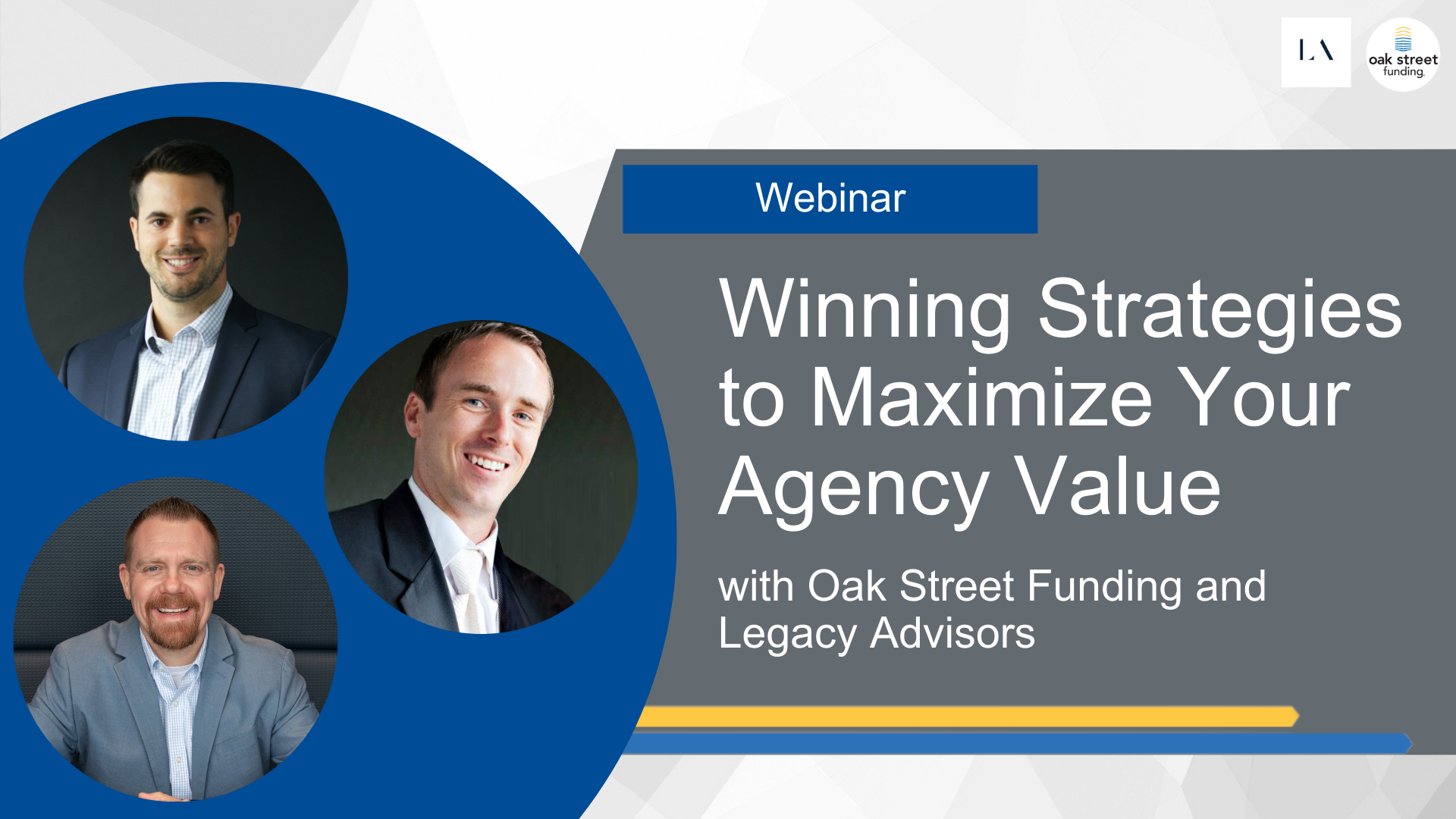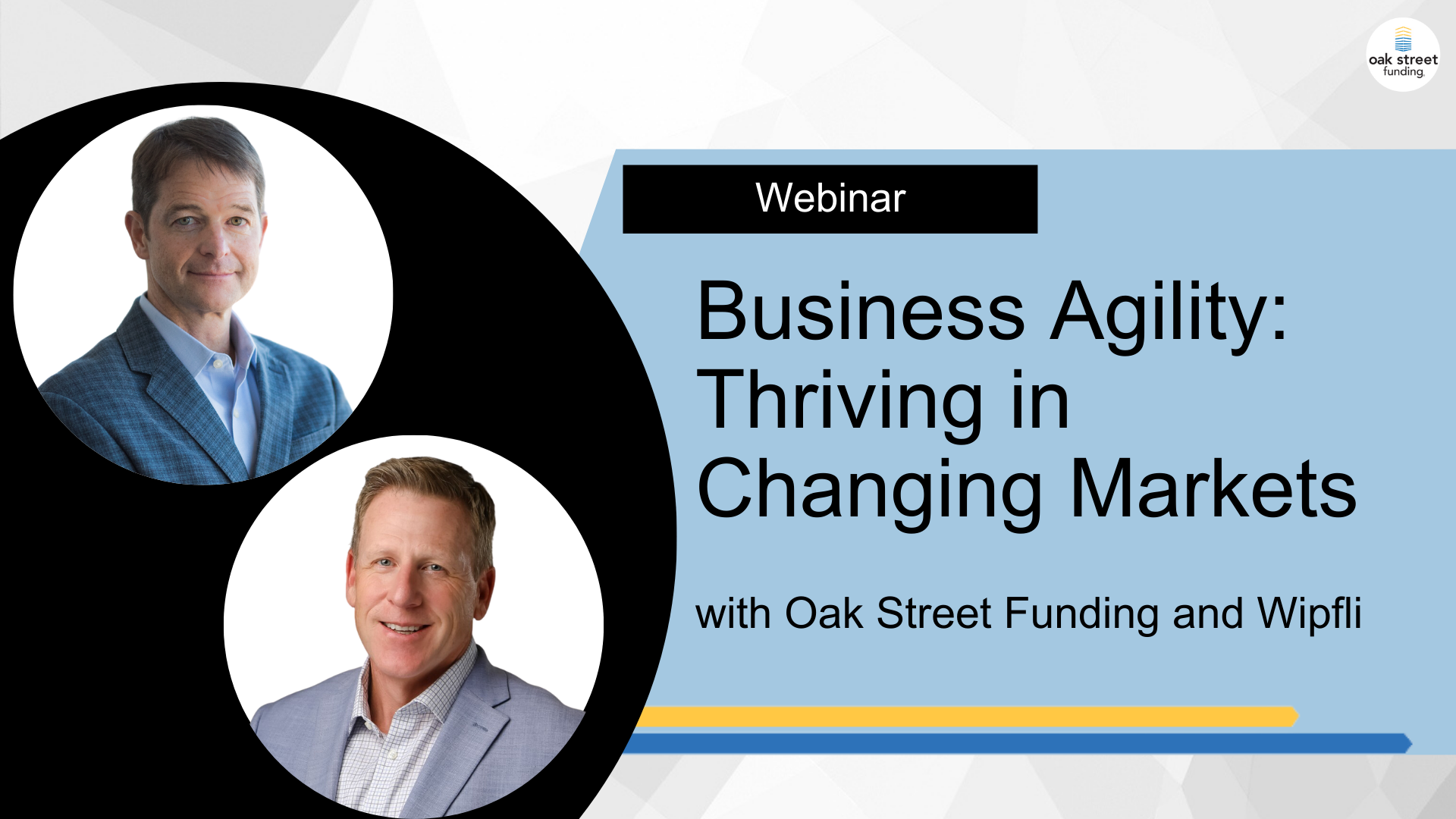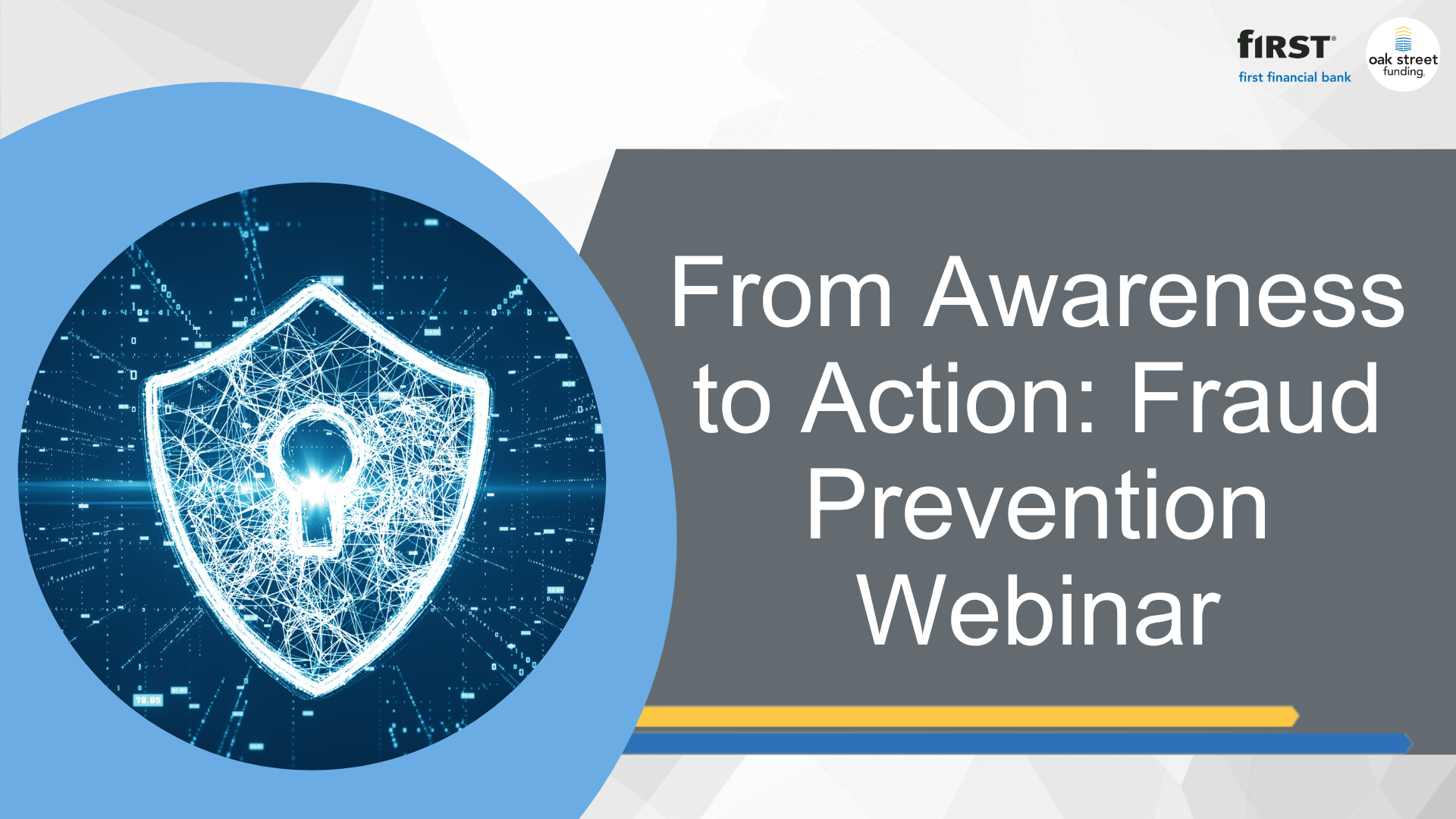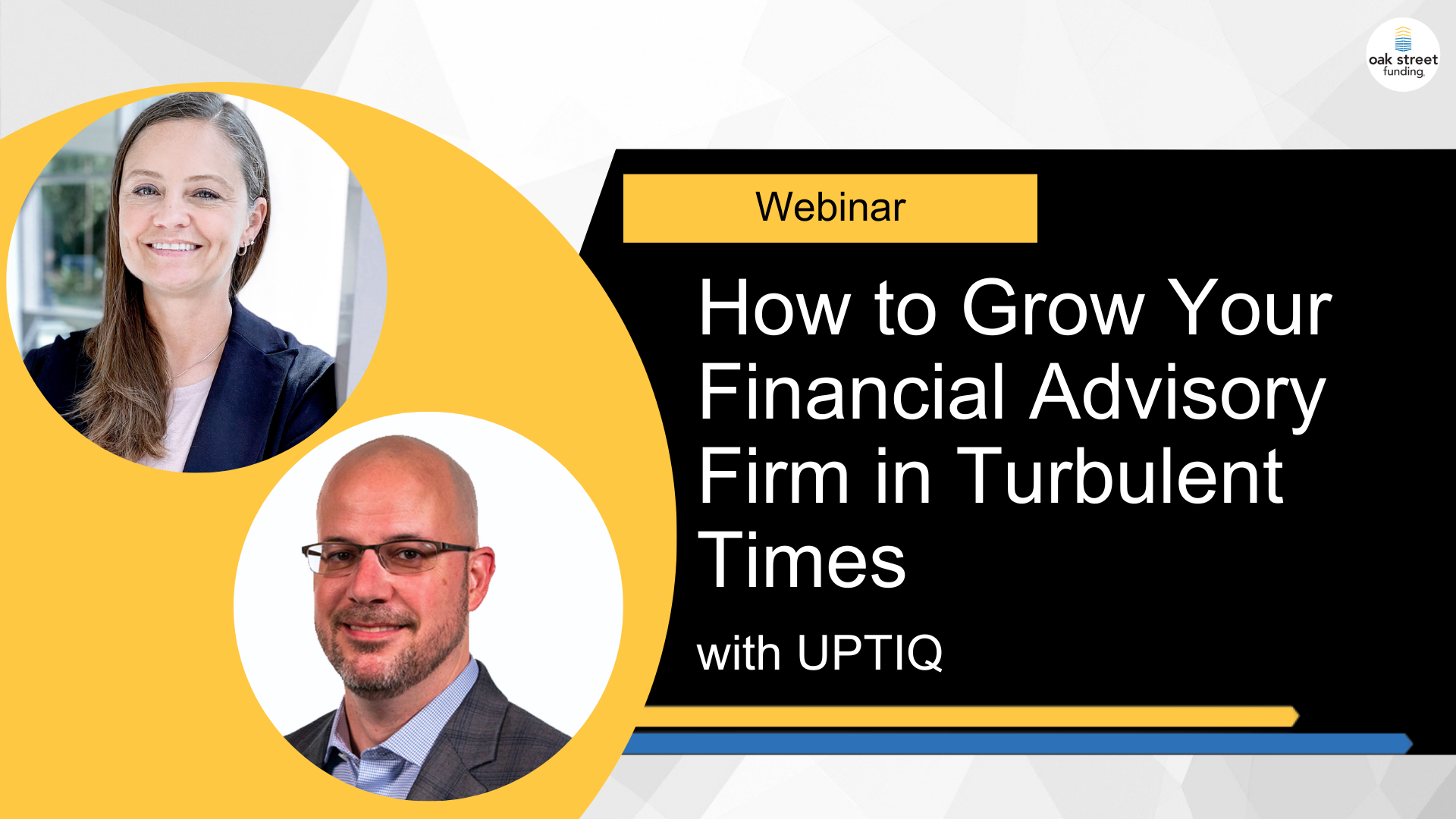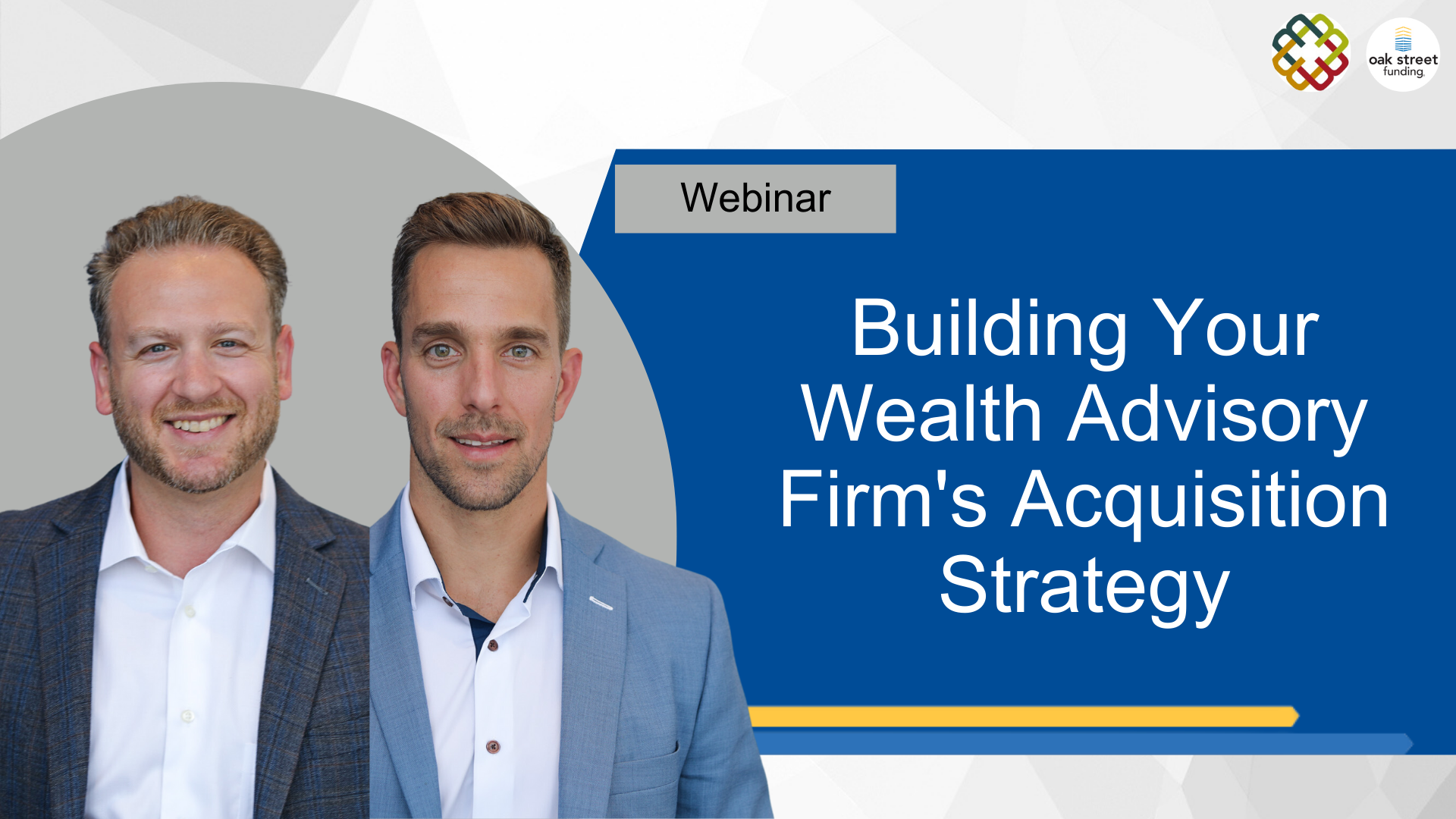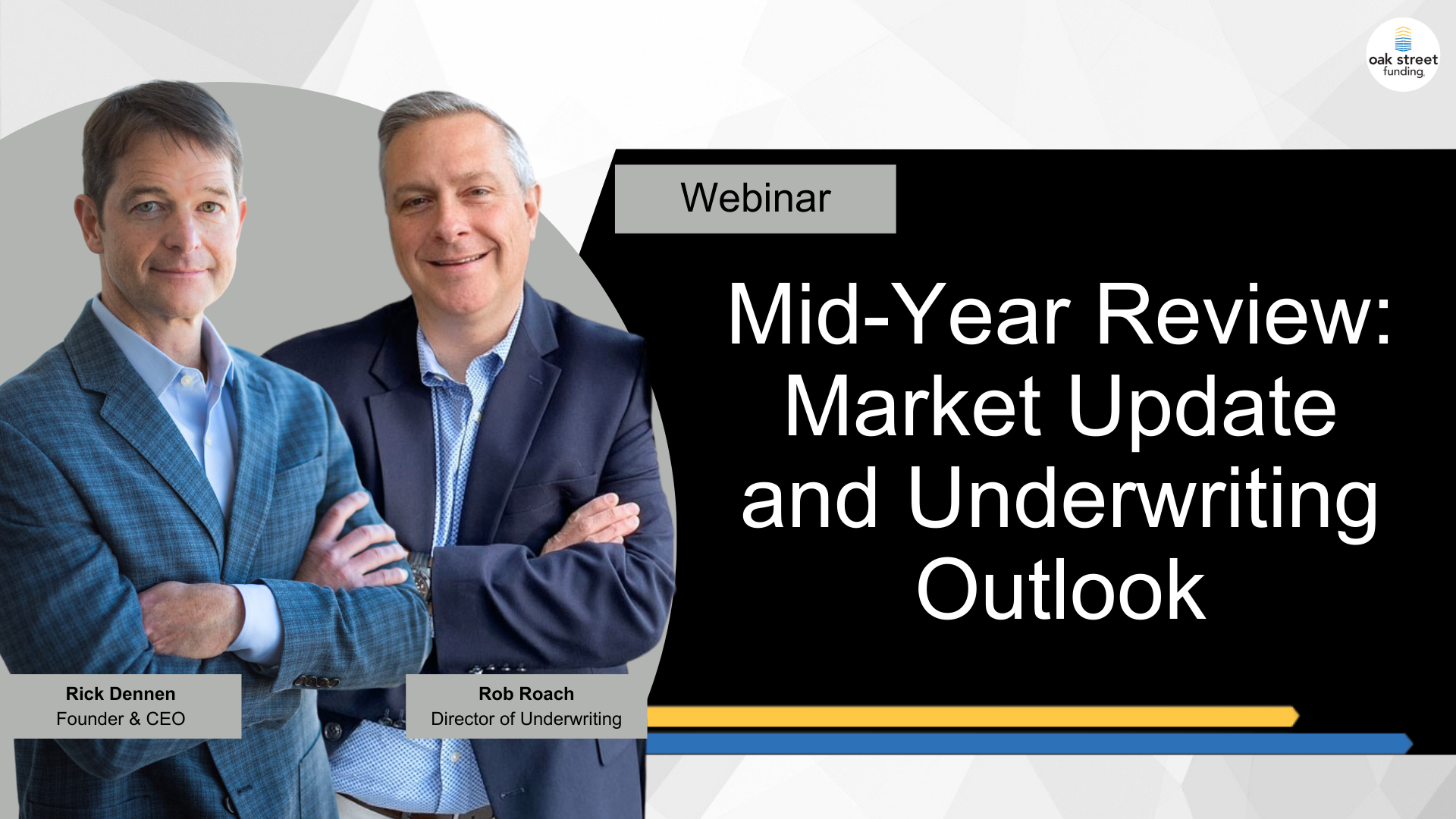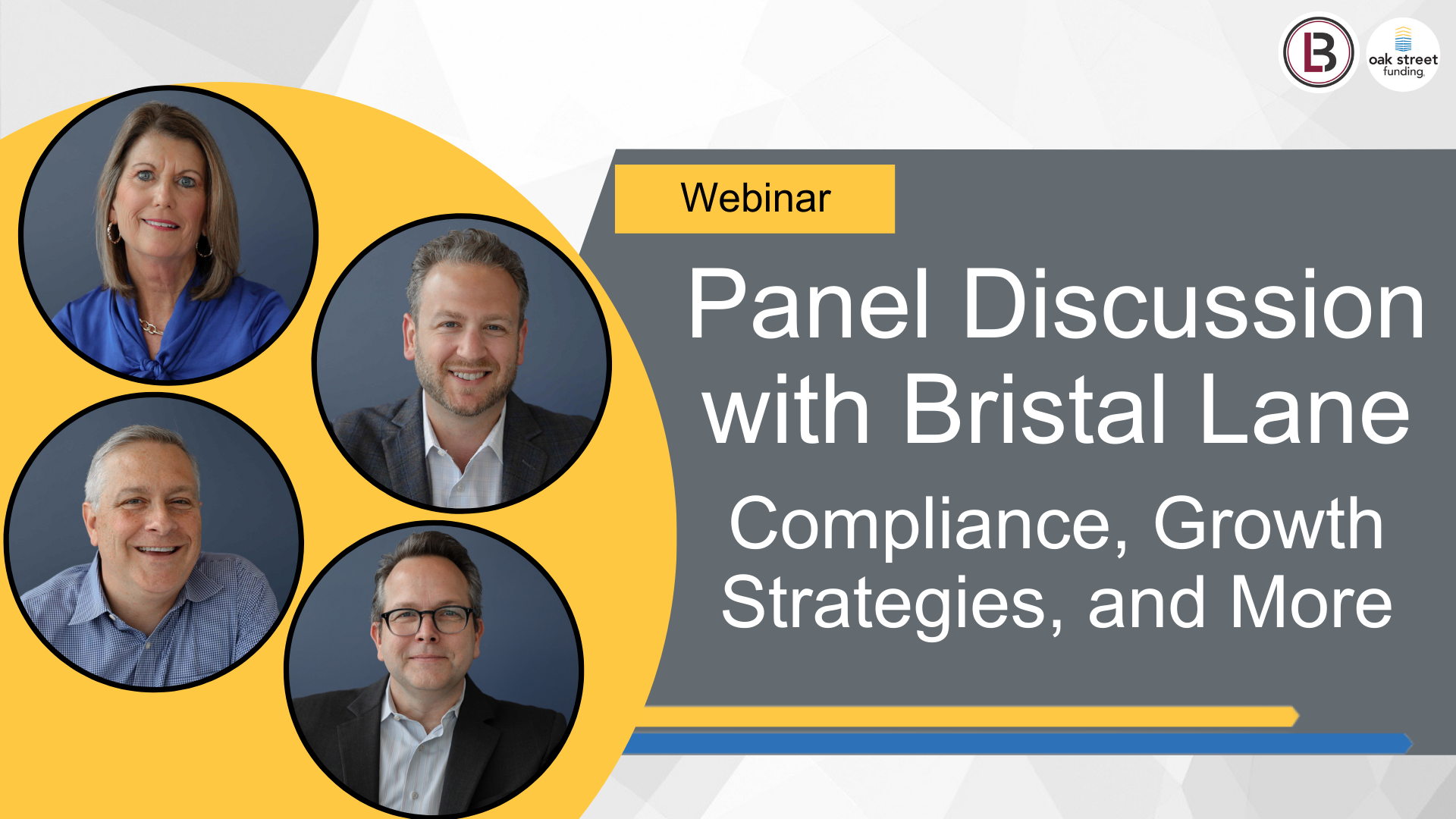Winning Strategies to Maximize Your Agency Value with Legacy Advisors
- 0.5
- 1
- 1.25
- 1.5
- 1.75
- 2
Bridget Haight: Hi, and thank you for joining us today as we discuss Winning Strategies to Maximize Your Agency Value. I'm your host, Bridget Haight, and I'm excited to be here with our panelists today, Max Olson and Mike Almberg, both partners at Legacy Advisors, a company that partners with insurance agencies that wish to be acquired to guide them along the process. They bring a unique perspective to the conversation with history of finding, scaling, acquiring, and selling insurance agencies. I also have Oak Street Funding's own VP of sales, Scott Stars. Scott brings over 10 years of experience helping agents buy and grow through providing capital and working in true partnership with clients. Thank you all for joining us, and I can't wait to just jump on in. We always hear people ask, " What is my agency worth?" But we don't necessarily think that that's the right question to ask most of the time. Instead, we ask you to ask yourself, " How can I make my agency worth more?" That'll be the topic of the conversation today, maximizing your agency value. Let's get started. To begin with, Mike, buying or selling an agency is a huge decision and many agency owners begin to really focus on their agency's value when it's time to buy or sell. It's a big decision. Where do you recommend they start?
Mike Almberg: Yeah. Thanks, Bridgette. Thanks for having us. I think it's important to start with the end in mind. Whether you're selling now or in 30 years, you need to understand your business and you want to try to figure out where you're actually trying to build. You can't do that without understanding your financials. One, you're going to run a better business because you'll have uncovered a bunch of different operational efficiencies within your own finances today. But, two, you're going to be able to compare with industry benchmarks and find different areas that you can improve based on others that have already done it. You really want to make sure that you have your financials in order first and foremost. You also want to educate yourself on how deals are structured and how buyers are coming up with valuations. There's internal valuations that you'd want to take to a divorce attorney or bank valuations if you're looking to take out debt to fund growth of your agency, and then there's valuations that we'll do for our client that are looking to go to market, and we'll try to give them a sense of what someone would be willing to pay for the business. Valuation is evaluation. There's different ways to look at it, but again, first is understanding your finances today.
Bridget Haight: Okay, great.
Mike Almberg: And the one thing we want to add... Max, if you want to hit on it, too, but oftentimes owners are pretty shocked at what their business is worth after they've gone through that process. On the buy side, I know typically one of the first steps is making sure you have financing in order because these deals come up pretty quickly. Scott, what do guys typically look for when you're looking to underwrite it?
Scott Stars: Yeah, that's a great question. We look for two years tax returns, year to date P& L, year to date balance sheet, as well as a book of business report, because we do like to drill in a little bit deeper than your traditional financing. And we want to know who the carriers are and how much commission or how much premium is flowing through each carrier for a rolling 12 months. That's a little unique for us, but typical two years tax returns, year to date numbers, balance sheet, book of business report... With that information, we can get a good idea of how much we can lend somebody.
Bridget Haight: Okay, great. We'll move on. When it comes to an agency trying to maximize the value once they sell, is it more important to be growing fast or super profitable? Max, I'll start with you.
Max Olson: Sure. I think it's important to have a combination of both. We've oftentimes seen really, really profitable agencies that they're more or less pulling all the money out of their agency they possibly can and they don't focus at all on growth. Ultimately, when they get to the point where they want to go through and then sell, they'll end up selling at a discount and it might not have been the best choice to have pulled so much money out. On the other end of the equation, we see groups which their only focus is on growth, and they don't really focus at all about making sure that they're lean and they're growing in a profitable way. I think you need to have at least some growth. That's like starting point, but you should be focusing on both of them. Combination is important.
Mike Almberg: Yeah, I agree with Max. You need a combination of the two. I would probably put a heavier weight on growth if it were me, especially from the lens if you were looking at selling to a larger partner, because that larger partner is going to have a lot of processes and procedures in place. They're going to have a lot of operational efficiencies just within their expense structure, too. So, getting plugged into something bigger is going to allow you to have better margins a lot of the time, but it's really hard to manufacture growth. If you come to the table with a bunch of really good producers and they're growing year after year, that's super attractive, I think.
Bridget Haight: Scott, how about a lender's view?
Scott Stars: Yeah, great question. Of course, I won't just echo what they said. I'll break it up a little bit and I'll say, from an underwriting perspective, I know what they're going to be looking for. Steady growth, of course, is something they want to see. Sometimes that hockey stick growth where you're growing too quickly, you could look into that and say, " How much of that business is sticky? How much is really going to stick around? And were they growing at a pace to where they're not concentrating on retaining those clients?" If a buyer were to come in and buy them, the attrition on the book could be really bad, honestly. Then profitability is important, of course. You want to be profitable, but if I'm looking at it from a buyer's perspective, knowing you're not going to be running the business the same way that seller did... Even as a lender, we know that we can take some different steps with add- backs and adjustments to make the company even look a little bit more profitable. Now, of course, again, looking back at the underwriting piece, you don't want too many add- backs of course. Hopefully, there's already some profitability in place so we don't have to make as many adjustments.
Bridget Haight: Okay, thanks for that. Moving on, the M&A market has been ultra competitive for buyers in recent years. Scott, in this current financial market, how are you seeing people get creative so the deals are still getting done?
Scott Stars: Yeah, creative is key.
Bridget Haight: Yes, I keep hearing this.
Scott Stars: Yes, with an exclamation point. As you've mentioned, the industry is ultra competitive and there's same size retail agencies or private equity, venture capitalists. There's a lot of competition in the marketplace, and so getting creative on the structure is something buyers and sellers really need to do to make sure the deal makes sense. We've seen a lot more of cash to closing to the seller. Of course, I have to put in there up to the 80% that we like, but then from there, a structure that sort of is on both sides of the fence profitable. What I mean by that is the seller can claw back a little bit of that work that they've put in over the last five, 10 years that they've owned the agency. If the agency continues to be profitable and continues to perform, then they can share in that success a little bit more, even post- sale. Having something there that is almost like it's a reward, that performance post- closing... I think that's important and that can create a little bit of creativity and set a buyer apart.
Bridget Haight: Okay, great. Hey, Max, how do you recommend a small to mid- size agency get value in today's environment if they're looking to acquire?
Max Olson: Yeah. I think the first thing that you've got to go through and then do is set yourself up to find the right potential sellers. If you're going to go through and then do that, you need to make sure everyone knows that you are in the market to acquire agencies. You're getting in touch with all the agencies that are in your local area. You're talking to carrier reps. Everyone should know it and they should have a good understanding about you and your background. On my end, I did 13 acquisitions over the time period that I owned my agency in an eight- year period, so it was a lot. When we went through and then doing it, it's not like hunting, it's more like farming; that you're going through and then creating the relationships upfront, so when the time comes if somebody's ready to sell, you're the first person that they call. If you can do that and combine it with trying to win on culture and reputation where they know it's a great place for their clients to be taken care of and their employees, that they have them to be taken care of as well, you put yourself in a good spot.
Mike Almberg: Yeah. That's the win- win, Max. I think the arbitrage opportunity, buying a smaller company to increasing your value and then... Even if you ended up getting acquired by a large organization, they're going to trade at a higher revenue multiple just because of the scale. That's great. I think that's a great play. I think the one thing you want to make sure of is that you're buying the right businesses. You don't want to just grow to grow. You don't want to buy an agency where they don't have the right culture, the right clients, or they're not doing what would make sense for you to have as part of your organization. You want to be buying the right stuff, too. You don't want to just grow for growth's sake because it's going to bite you in the long run.
Bridget Haight: Great advice.
Scott Stars: Yeah. I think you hit it right on top of the head there, Mike, because so many times people call me and they're just... This is all that's available and they're fitting a... What do they say?
Bridget Haight: Square peg in a round hole?
Scott Stars: Exactly right.
Bridget Haight: It sounds like...
Scott Stars: And I'm like, " Hey, well this might not be a great fit for you just because this is all that's available. You're going to say no to more deals than you're going to say yes to."
Bridget Haight: Yeah.
Mike Almberg: A hundred percent. I'm sure we'll hit on this later in the conversation, but people are so important. One, you want to like who you're working with, obviously, but just from a skillset perspective, if you can acquire a business and bring a certain group of people with a certain skillset that you're lacking to your organization, that's huge. There's a ton of opportunity. And then again, that's the win- win that we were kind of just talking about. It's going to work for everybody.
Bridget Haight: Great. The businesses that you see get top tier multiples. What does the makeup of their team look like? How important are the team members in garnering top dollar for a business? Mike, I'll start with you.
Mike Almberg: Sure. Yeah, it is extremely important. Every agency, obviously, has a book of business that a buyer will pay for and they'll get a financial return on that. It's a recurring revenue. Insurance is great. On top of that, a business that gets the highest multiple also comes with rockstar leadership, the ability to attract, retain talent, train, having a strong culture. At the end of the day, all these larger agencies that are buying, whether it's an Oak Street customer or client or a larger private equity firm, they all have aspirations to grow organically. If they can also acquire talent and processes and even learn a little bit from the agencies that they're buying, they're going to pay more for it.
Max Olson: Yeah, I think it all boils down to the better you make your business between the processes and the people, the more money that buyers will be willing to pay for it. Invest in your business, then it pays off.
Scott Stars: I know underwriting... When we look or when underwriting looks at my write- ups and my flagpoles as I'm presenting to them, they're always going to have that question, " What parts of the team are sticking around?" And that is key to them. I know we're seeing an uptick in people who are doing the acqui- hire or acqui- hire, if you will, where they're acquiring to hire in the labor market. That's important. I think both of them just hit on it, but especially when there are so many acquisitions that take place across state lines or across multiple state lines, a lot of these acquisitions are not somebody down the street buying somebody down the street anymore. It could be somebody over in Columbus, Ohio purchasing somebody out in Utah. I think when you see that, the team is going to be very important to understanding who's going to be there to continue to help the agency with the buyer being across the country.
Bridget Haight: Okay. We've covered some of the basics in what makes an agency more valuable. I want to ask all three of you to share more tangible tips and tricks that you have in terms of strategies to increase in the agency's margin and thus improving their overall value. Max, I'll start with you.
Max Olson: Sure. I think, first, just focusing on making your agency a great place to work at and a great place to have your policy, because if you establish a strong culture with solid processes and focus on growing while being lean, your business is going to be worth a lot more, and you're going to have better margins. If you've got happier employees, happier clients, retention is better on both sides, that feeds a lot into margins. It's really difficult to go through and find great employees and great clients every single year. I'd also go through and then reference... A lot of times it makes sense to hire consultants to go through and help you in the areas that you may not be as strong in your business, whether that be financial side and just the financial portion of it's just like speaking Greek, whether it's to go through and then improve your retention, to have an uplift on new business, just be able to manage your operation better. There's a lot of really talented professionals at this point that are insurance industry specific that can help you be a better business owner, which will ultimately help you have better margins.
Bridget Haight: Great. Mike?
Mike Almberg: Yeah. Tax is even another one, Max. You want to have conversations with your CPA and make sure you're walking away with as much money as you can, and you're not leaving anything on the table, both while you're running the business. We've had a couple scenarios recently where our clients were paying taxes that they shouldn't have been paying for the last 10, 15 years. But also when you're actually selling, you want to make sure that you're structured accordingly. We're not CPAs, so talk to your CPA, but you obviously don't want to leave money on the table. It's pretty frequent.
Max Olson: It can be big differences there, too, like hundreds of thousands of dollars if you don't have it structured the right way.
Mike Almberg: Yeah.
Bridget Haight: Well, thank you for that. As we start to wrap up, I would like to offer those listening an example of where you have seen these practices put into place by someone who truly maximized their agency value.
Mike Almberg: We actually just worked with a client here in New England that just about doubled their value over the last 18 months. They were growing really quickly, but they hired the right people. He got the right people on his team to grow. He hired ahead of the growth. They really focused on accelerating with an interesting niche that they had kind of carved out through their backgrounds and expertise. That created a really interesting story to pitch to buyers. They didn't have any unnecessary payroll or any unnecessary expenses, and he obviously engaged with the best M& A advisory firm to get him the best financial and cultural fit, but, yeah, that was a great inaudible.
Bridget Haight: Great. Max, do you have an example?
Max Olson: I think there's loads of examples. That's probably the best one that we've come across. Ultimately, I think if you're going through and then have a real focus on being lean one to two years before you've actually gone through and then sold, that helps out a ton. It just changes your perspective on your business, too.
Bridget Haight: We've been talking a lot about how to increase value of your agency in the years leading up to a sale. Are there other things that you can do in the months or weeks leading up to a sale that would add value to your agency? Scott, I'll ask you first.
Scott Stars: Yeah. I'll probably start on the flip side of the coin with something for buyers to consider, because sometimes when they are looking at maximizing the value of what they're buying, you're taking that proforma look at a potential new tier that you could fall into with a carrier or multiple carriers. You could increase your premium with them. And with increased premium, it could put you in a new and renewal business commission tier, if you will. But also when you take a look at contingency bonuses, carriers will pay out contingency bonuses and that, again, could put you into a new tier to where you can actually make more on the book of business than what the seller is actually making on it now. What is the value of this company to me versus what it is to you? Those could be two completely different numbers and actually lower that multiple that you're paying, because you will be making more revenue than what the seller was making. That might be something maybe for the buyer to consider, but maybe flip it over to Mike and Max... When you guys are working with those sellers, what are some things to consider there?
Mike Almberg: Yeah, absolutely. Just the way that you outlined that buyers recognize that there's opportunity with stronger contracts with scale, and we try to do the same thing when we're representing our sellers. We recognize a lot of times that buyers have better terms, so we'll try to build that into our proforma models during our process. A lot of times our clients will look at things like contingent revenue, and that'll make up... call it 3% or 4% of their total revenue because they're dealing with smaller numbers. One loss could really throw off your bonus for the whole year. When you're a part of a large organization, that number is going to be closer to 10 or double digits as a percentage of revenue. So, what we'll try to do is adjust our proforma to reflect some growth on that side, too.
Max Olson: Yeah. I think there's a lot of stuff. It helps to go through and then start the planning process as early as you can, but there's a lot of items that you can do in the month or two months before you sell. I think, again, going back to understanding your financials, because it helps a lot for adjustments. Being able to pull out expenses that may not exist on a go forward basis, that's huge. Those could be personal, they could be one- time expenses. Oftentimes, especially if a business has been ran for a long time, it's a family business. There's a lot of things that go into it that may not exist in the future. Probably have a few funny stories and things that we've seen. I think also, a lot of times, especially in the insurance agency world, there's family that's involved in the business. Lots of times, compensation for family members is not exactly what would be in line with the market. The husband or the wife or the dad or mom goes through, and then they're making an executive level pay but they're showing up every other week. I think, also, it helps to go through and then note and address any of your company's strengths so you know them upfront. Because the better that could be articulated to buyers, the more valuable your company is, because a lot of times the value add is what the difference is between someone getting an 8x EBITDA offer and a 9x EBITDA offer. They're filling a hole that somebody needs to have filled.
Bridget Haight: Cool. As a final question, we have touched on many things someone can do to have success, such as the example you just shared. However, are there common missteps in the process that agents should be aware of or things that everyone should prepare for? Scott, I'll start with you on that one.
Scott Stars: Yeah. I say communicate early, even if it's bad news. We can help if we know what the capital needs are ahead of time. Even if you're not looking to acquire or sell today, could be five, could be 10 years down the road, it's better to come to your lender early. Let's start setting some goals, setting some parameters, and understand what it is that you want to do. I think, as the guy said from the very beginning, it's never too early to start this process. You may be surprised of what you hear from me in a conversation that can be something that doesn't come to fruition until five or 10 years down the road.
Bridget Haight: Okay, great. How about you, Max?
Max Olson: Yeah. I think it's really hard to go through and then make all of the right decisions when you go through and then sell your insurance agency. It's hard to go through and do that if you're doing it on your own. I think the first thing that people need to go through and do is get the right people on their team, whether that's an M& A advisor, their attorney is very important, their CPA just making sure that things work out properly. We've all heard stories of people selling and picking the wrong partner, and a lot of times it was entirely avoidable. The right questions weren't asked. There wasn't really as much of a focus on the day two culture as there should have been. If you have the right people that are on your team that have gone through and then done this before, it helps a lot to go through and then avoid mistakes that either could be large financial ones or just situations where you really would love day two and don't want to stay there for day four.
Mike Almberg: Yeah, totally agree. Just educate yourself and try to understand your options as best you can.
Bridget Haight: Great. Well, thank you all. I appreciate all those insights. Thank you for joining us today for our webinar on Winning Strategies to Maximize Your Agency Value. We hope you found this information helpful. If you have any questions, please feel free to reach out to us. You will receive the recording and contact information for each panelist in case you want to learn more. Thank you so much for joining us.
DESCRIPTION
We often hear people ask, "What is my agency worth?" But is that the right question to be asking? Join Scott Stars, VP of Strategic Market Sales at Oak Street Funding, and Max Olson and Mike Almberg, Partners at Legacy Advisors, as they urge you to instead ask yourself, "How can I make my agency worth more?"

